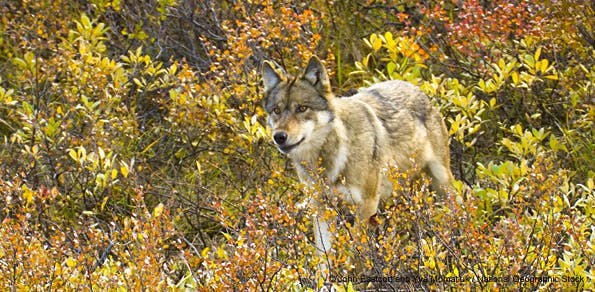Tough times for wolf conflicts – It’s been a rough couple of weeks for both people and wolves, putting serious strain on the already tenuous relationship between man and beast. But several recent incidents offer valuable lessons that will help us all learn to better coexist with wildlife.
- We were surprised earlier this week to learn that a wolf had apparently attacked a young man in northern Minnesota while he was camping. Such attacks are exceedingly rare and the wolf in this case was reportedly habituated to humans and had some malformation of its jaw. Even among healthy wolves, only two known deaths have occurred from wild wolf attacks across all of North America in modern history. For comparison, at least a couple dozen people die every year from domestic dog attacks. Fortunately, the teenager appears to be okay after suffering a deep gash to the top of his head, and we wish him a speedy recovery.
Incidents like these are an important reminder that any wild animal can be a potential threat, especially one that is injured or has become habituated to people. The return of gray wolves to the Great Lakes and other parts of the country has been a tremendous wildlife conservation success story. But with it comes a responsibility to learn how to safely coexist with wildlife. For more information, visit www.defenders.org/LivingWithWildlife.
-

©Chagares Photography
Another Yellowstone wolf was killed this week after it preyed upon chickens and a house cat near Jardine, Montana. The collared female wolf was a part of the Lamar Canyon pack that dispersed several months ago after the alpha female, 832F, was killed by a hunter. It appears that some nonlethal hazing was attempted first, but the wolf had likely become habituated to humans while living within Yellowstone National Park. Evidence suggests that this animal was even being fed by people, which is a recipe for disaster. Remember, a fed wolf is a dead wolf.
- Wildlife Services killed 13 wolves in Idaho last week after the Pine Creek pack was blamed for causing the death of 176 sheep. The herders claimed that two wolves frightened the sheep, causing them to stampede and stumble down a rocky slope. The sheep had been grazing on public land in the Caribou-Targhee National Forest, not far from Grand Teton National Park, a sanctuary for wildlife including wild predators. American taxpayers are thus faced with a triple whammy: subsidizing public grazing, paying to kill the wolves, and compensating for the losses. You can help us put a stop to the senseless killing of wildlife on public lands by signing our petition to reform Wildlife Services.
- Oregon has so far taken a measured approach with three recent depredations. Based on the state’s new management policy, a wolf must be involved in four “qualifying incidents” in six months for the state to consider removing the offending wolf. A qualifying incident requires that landowners implement at least one preventive measure and eliminate all unnatural attractants in the week before the incident. The new policy is designed to balance the interests of wildlife advocates and ranchers by forcing both parties to find new ways for livestock and wolves to coexist. Hopefully Oregon’s model will catch on soon in other states.
Wolves deserve fair hearing – The Register-Guard of Eugene, Oregon came out with an excellent editorial this week criticizing the U.S. Fish and Wildlife Service’s handling of its wolf delisting proposal. The paper says FWS was right to delay its flawed peer review process but should go a step farther and abandon its premature delisting plan altogether.
“Gray wolves need a fair hearing from the Fish & Wildlife Service — and they need a stronger, long-term federal management plan that provides for a sustainable number of wolves across their entire range so that they can survive and thrive for years to come.”
We’re still expecting that FWS will extend its public comment period, which is scheduled to close on Sept. 11. But just in case it doesn’t, be sure to submit your comments today so that your voice can be heard. Help us support continued wolf recovery and put a stop to the delisting disaster!
Attend International Wolf Symposium – Join Defenders President Jamie Rappaport Clark and our top wolf expert Suzanne Stone for the 2013 International Wolf Symposium. The event is hosted by the International Wolf Center and will be held Oct. 10-13 in Duluth, Minn. Suzanne will be giving a presentation about our Wood River Wolf Project, and Jamie will deliver the keynote address. Don’t miss your chance to mingle with wolf experts and to learn more about the future of wolf recovery.
Hunting season opens in Idaho – After a very brief respite, wolves in Idaho are back under fire. The 2013-2014 general hunting season opens today statewide and runs through the end of March. Trapping season begins on Nov. 15 across most of the state, and some private lands in the northern Panhandle Zone now remain open year-round for hunting. Read more in the Boise Weekly.



